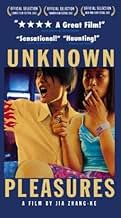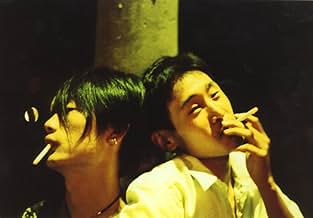IMDb RATING
6.8/10
2.8K
YOUR RATING
Two unemployed Chinese teenagers have trouble resisting the temptations of the Western world.Two unemployed Chinese teenagers have trouble resisting the temptations of the Western world.Two unemployed Chinese teenagers have trouble resisting the temptations of the Western world.
- Awards
- 2 wins & 5 nominations total
Limin Wang
- The Karaoke Customer
- (as Wang Li Min)
Juan Antonio Samaranch
- Self
- (archive footage)
- (uncredited)
Jia Zhang-ke
- Man singing in street
- (uncredited)
- Director
- Writer
- All cast & crew
- Production, box office & more at IMDbPro
Featured reviews
I saw this film at the IFP LA Film Festival on June 16, 2003. It started out pretty well, but became aimless and sort of meandered. I couldn't root for any of the characters. The background of economically depressed mainland China is interesting, but only for a while. After half an hour, I wanted characters I cared about, but this movie didn't have any. It's not that the young actors weren't talented, it's just that the script was anti-climatic and didn't leave me wanting more, I just wanted the movie to end.
Unknown Pleasures portrays Bin Bin and Xiao Ji, two young Chinese men living in the city of Datong, several hundred miles west of Beijing. Theirs is a city in transition; crowded streets and apartment blocks back onto building sites, weird landscapes of debris and raw materials. The growing commercialisation of Chinese society is readily apparent; in an early scene the duo attend a lurid road show promotion for alcoholic drinks. The television news that punctuates the film shows the changes and conflicts in China and the effect these are having across the world, from the controversial US spy plane crash to the award of the Olympic games for 2008.
The two young protagonists are outsiders in their changing city. Bin Bin, newly unemployed, lives with his mother. Unwilling then unable to find new employment, he becomes increasingly despondent. His relationship with his girlfriend, Yuan Yuan, is lived out in front of a television screen: they rarely make eye contact. The cultural void in his life feels remarkably Western. Xiao Ji works for his father's garage business. Whilst Bin Bin becomes increasingly downcast, Xiao Ji dreamily pursues Xiao Wu, a dancer with the aforementioned road show, risking the anger of her volatile boyfriend.
The overlapping stories of the two friends develop a common theme of loneliness and yearning on the fringes of a rapidly changing society. The sense of despair and malaise in their lives is powerfully conveyed, but the increasing aimlessness of their activities makes for slow and often difficult viewing. The final third of the film is particularly slow, with many drawn-out scenes. Despite this slackening of the pace, an unexpected twist at the end rams home the film's message that, along with the new freedoms in China, there is disenchantment with the new shape of society.
The two young protagonists are outsiders in their changing city. Bin Bin, newly unemployed, lives with his mother. Unwilling then unable to find new employment, he becomes increasingly despondent. His relationship with his girlfriend, Yuan Yuan, is lived out in front of a television screen: they rarely make eye contact. The cultural void in his life feels remarkably Western. Xiao Ji works for his father's garage business. Whilst Bin Bin becomes increasingly downcast, Xiao Ji dreamily pursues Xiao Wu, a dancer with the aforementioned road show, risking the anger of her volatile boyfriend.
The overlapping stories of the two friends develop a common theme of loneliness and yearning on the fringes of a rapidly changing society. The sense of despair and malaise in their lives is powerfully conveyed, but the increasing aimlessness of their activities makes for slow and often difficult viewing. The final third of the film is particularly slow, with many drawn-out scenes. Despite this slackening of the pace, an unexpected twist at the end rams home the film's message that, along with the new freedoms in China, there is disenchantment with the new shape of society.
Unknown Pleasures is the first Jia Zhang Ke film that I have seen and it is excellent. The setting is a town in the north of China, but it could be anywhere in the developing world - India, Argentina or South Africa, for example - where neo liberal economic policies have benefitted the urban elite, but created dislocation for millions of others. The director undoubtedly has a deep social conscience.
The film focuses on several young people, members of China's "new new" generation. As the films progresses, we see what the new world order offers them - US currency, American pop culture, the 2008 Olympics, new super highways - contrasted with the reality - few opportunities for young people, laid off state factory workers and a general degradation of moral values. The message is clear: the new world order offers common people everything in return for giving up traditional ways of life, but actually delivers little of substance. As Bin Bin puts it when he finds out that his girlfriend is going to Beijing to study international trade: "WTO is nothing. Just a trick to make some cash."
The social realist style - it has a bit of a documentary look to it - and the pop song which the film is named after and which features prominently in it (Ren Xiao Yao - the lyrics speak about youth alienation, particularly a desire for freedom and pleasure) also provide a cutting edge look and feel. The song is emotive and will strike a chord with those who like explorations of youth alienation.
However, the film, as befits the political and artistic climate in China, is very subtle and understated, and may escape those who have little knowledge of current affairs in China or an insensitivity to the economic and social dislocation that is taking place outside the big cities (this is not a good date movie for the corporate Western expat and his urban Chinese girlfriend who measure progress by the number of new condos and Western restaurants in Shanghai).
This is great indie filmmaking, though, and I would particularly recommend it to socially and politically aware twenty and thirtysomethings who like artistic expression that is intelligent, socially conscientious and cutting edge.
The film focuses on several young people, members of China's "new new" generation. As the films progresses, we see what the new world order offers them - US currency, American pop culture, the 2008 Olympics, new super highways - contrasted with the reality - few opportunities for young people, laid off state factory workers and a general degradation of moral values. The message is clear: the new world order offers common people everything in return for giving up traditional ways of life, but actually delivers little of substance. As Bin Bin puts it when he finds out that his girlfriend is going to Beijing to study international trade: "WTO is nothing. Just a trick to make some cash."
The social realist style - it has a bit of a documentary look to it - and the pop song which the film is named after and which features prominently in it (Ren Xiao Yao - the lyrics speak about youth alienation, particularly a desire for freedom and pleasure) also provide a cutting edge look and feel. The song is emotive and will strike a chord with those who like explorations of youth alienation.
However, the film, as befits the political and artistic climate in China, is very subtle and understated, and may escape those who have little knowledge of current affairs in China or an insensitivity to the economic and social dislocation that is taking place outside the big cities (this is not a good date movie for the corporate Western expat and his urban Chinese girlfriend who measure progress by the number of new condos and Western restaurants in Shanghai).
This is great indie filmmaking, though, and I would particularly recommend it to socially and politically aware twenty and thirtysomethings who like artistic expression that is intelligent, socially conscientious and cutting edge.
Unknown Pleasures is a fantastic film, but not one I would recommend to my friends. When you're used to seeing Hollywood film-making, it's difficult to watch a Chinese movie that makes other indy films look glitzy.
This is not a film that reaches out and grabs you. The camera keeps an unemotional distance from the characters at first, and only through the use of repetition and extended, unedited shots, does the filmmaker draw the viewer's attention to the subtle details which make this film so powerful.
The main characters dream in a world of American pop-culture and pro-Chinese propaganda, but the camera captures their bleak existence with devastating realism. Through his rejection of western cinematic techniques, the director brings this film brilliantly to life. Yet, for this very reason, many viewers will find it boring.
This is not a film that reaches out and grabs you. The camera keeps an unemotional distance from the characters at first, and only through the use of repetition and extended, unedited shots, does the filmmaker draw the viewer's attention to the subtle details which make this film so powerful.
The main characters dream in a world of American pop-culture and pro-Chinese propaganda, but the camera captures their bleak existence with devastating realism. Through his rejection of western cinematic techniques, the director brings this film brilliantly to life. Yet, for this very reason, many viewers will find it boring.
Learning that this film is from the makers of the tedious PLATFORM is not encouraging and the new work has the same murky color and long, unedited shot coverage.
However this one benefits from the stronger narrative elements - nihilistic kids turn to crime as their ambitions are thwarted, no mating with the traveling show chantoosie or becoming a Beijing soldier - along with the detailed account of joyless small town Datong Province life in decaying buildings where finding a US dollar in the liquor bottle the entertainers are plugging represents sudden fortune.
In the line of BEIJING BASTARDS and less engaging that GE GE/ BROTHER which covers much the same ground, this still suggests that the Chinese cinema may be evolving a sub-surface layer of effective, critical entertainment.
However this one benefits from the stronger narrative elements - nihilistic kids turn to crime as their ambitions are thwarted, no mating with the traveling show chantoosie or becoming a Beijing soldier - along with the detailed account of joyless small town Datong Province life in decaying buildings where finding a US dollar in the liquor bottle the entertainers are plugging represents sudden fortune.
In the line of BEIJING BASTARDS and less engaging that GE GE/ BROTHER which covers much the same ground, this still suggests that the Chinese cinema may be evolving a sub-surface layer of effective, critical entertainment.
Did you know
- TriviaMandarin title refers to a song by Richie Jen
- Quotes
Mr. Ren: Welcome to auditions for the Mongolian King Liquor Troupe! Please applaud our city's famous singer and dancer, Miss Zhao Qiao Qiao, in her modern dance number titled "Unknown Pleasures". The performance reminds us the Mongolian King spirits! Drink Mongolian King! Drink Mongolian King!
- ConnectionsFeatures Le roi des singes (1961)
Details
Box office
- Gross US & Canada
- $11,254
- Opening weekend US & Canada
- $3,628
- Mar 30, 2003
- Gross worldwide
- $55,901
Contribute to this page
Suggest an edit or add missing content




















